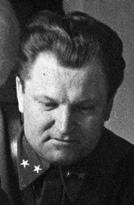Alexei Illarionowitsch Kirichenko
Alexei Illarionowitsch Kiritschenko (Russian: Алексей Илларионович Кириченко; born February 25, 1908 in Chornobayivka , Cherson Governorate , Russian Empire ; † December 28, 1975 in Moscow , Soviet Union ) was a Soviet and Ukrainian politician.
biography
Ascent
Kirichenko, the son of a railroad worker, first attended the tractor school, then worked as a mechanic on state property in the Ukraine and then studied agricultural engineering at the Azov Black Sea Institute. In 1930 he became a member of the CPSU . From 1938 to 1941 he was active in the apparatus of the Ukrainian Central Committee , rose to the position of Secretary of the Central Committee of Ukraine from 1941 to 1945 and was then First Secretary of the Odessa Region Party between 1945 and 1949 . From 1949 to 1953 he was second and 1953 to 1957 first secretary (ie party leader) of the Central Committee of Ukraine; in this position he replaced ex Politburo member Leonid Melnikow . From 1952 to 1961 he was also a member of the Central Committee of the CPSU.
With Khrushchev at the center of power
After Josef Stalin's death he was one of the unconditional loyalists of the new First Secretary of the CPSU Nikita Khrushchev . From 1953 to 1955 he was therefore also a candidate for the Politburo (former designation: Presidium): Then he rose to the highest political body of the USSR together with Mikhail Suslov , he became a full member of the Politburo of the Communist Party of the Soviet Union (CPSU) in the period from July 12, 1955 to May 4, 1960. At the same time, he was from December 19, 1957 to May 4, 1960 Secretary of the Central Committee of the party.
In disgrace
At the beginning of 1960 he fell out of favor, as did a Politburo member Belyayev ; he was replaced as a Politburo member and secretary and deported as the first secretary of the Central Committee of the Rostov region , only to be finally adopted five months later. It is unclear why the two Khrushchev supporters Kirichenko and Belyayev were removed from the center of power in 1960; Khrushchev's decline - who lost his post in 1964 - was now looming.
If one believes the statements of Enver Hoxha , then Kirichenko probably sympathized with the Chinese Communist Party (CCP), but certainly with the Party of Labor of Albania (PAA). According to Hoxha, Kirichenko told an Albanian diplomat that "the way your party (the PAA) has exposed Khrushchev is excellent". He was also against the reconciliation with the Yugoslavs, whom, like the Albanians, he viewed as revisionists. If one takes Hoxha's statements to be true, it is conceivable that Khrushchev removed him because of these positions.
literature
- Michel Tatu: Power and Powerlessness in the Kremlin , Ullstein, Frankfurt, 1967
- Merle Fainsod : How Russia is governed ; Kiepenheuer & Witsch, 1965
Individual evidence
- ↑ Enver Hoxha , The Khrushchevians - Memories . Chapter 6: The Official Proclamation of Revisionism.
- ↑ Enver Hoxha , The Khrushchevians - Memories . Chapter 6: The Official Proclamation of Revisionism.
| personal data | |
|---|---|
| SURNAME | Kirichenko, Alexei Illarionovich |
| ALTERNATIVE NAMES | Кириченко, Алексей Илларионович (Russian) |
| BRIEF DESCRIPTION | Russian and Ukrainian politicians |
| DATE OF BIRTH | February 25, 1908 |
| PLACE OF BIRTH | Chornobayivka , Cherson Governorate , Russian Empire |
| DATE OF DEATH | December 28, 1975 |
| Place of death | Moscow , Soviet Union |

